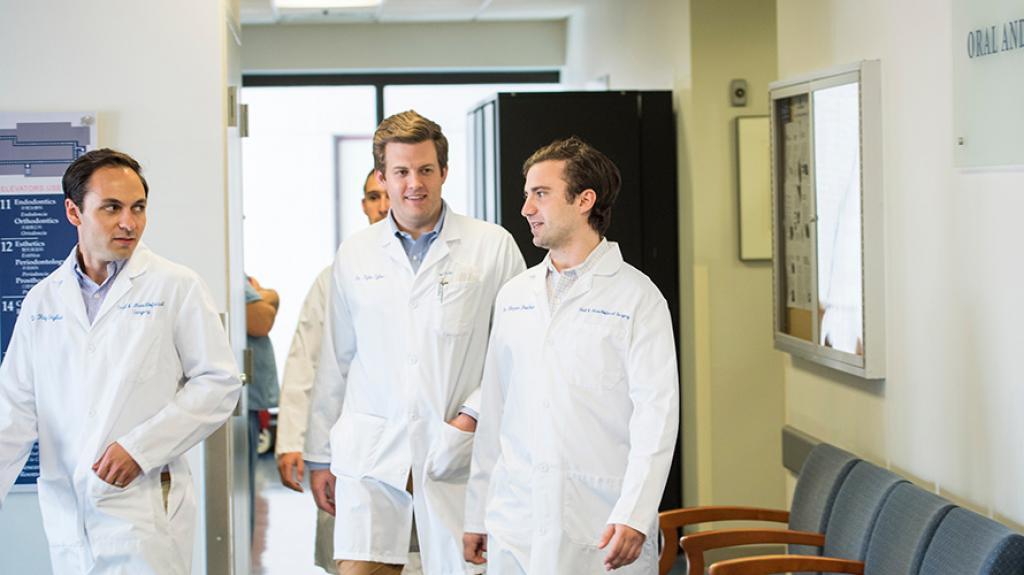Advanced Education in Oral and Maxillofacial Surgery

The Advanced Education program in Oral and Maxillofacial Surgery (OMFS) is a four year program and provides the resident with a broad academic background in biomedical sciences and surgical principles, in the diagnosis and management of medically compromised patients, and the fundamental knowledge, principles and surgical skills in the treatment of major and minor OMFS problems.
The academic and clinical aspects of this program complement each other and fulfill all the requirements established by the American Board of Oral and Maxillofacial Surgery and the Council on Dental Education Accreditation of the American Dental Association.
About the Program
During the four years of training, residents are exposed to the basic and applied sciences, in particular pathology, laboratory medicine, physical diagnosis, medical sciences, pharmacology, surgical anatomy, experimental oral surgery, general surgery, and anesthesiology. Special emphasis is placed on major and minor oral surgery, as well as broad experience in out- and in-patient general anesthesia. The residents are required to attend lectures, seminars, conferences, and clinics at the University and affiliated hospitals. The resident participates actively as a member of the oncology team at Tufts Medical Center in the management of head and neck tumors. The second year of the program is entirely devoted to general surgery, general anesthesia, and surgical specialties including otolaryngology. The major teaching hospital of Tufts University School of Dental Medicine is Tufts Medical Center Hospital.
The student is required to participate in basic and/or clinical research, leading to publication and presentation of their research. Academic credits received during the four years may be directed toward an M.S. degree, but time beyond the four years will be necessary to complete the requirements for the MS degree.
Emphasis is placed upon training the residents to the standards for Board certification. Thus, residents are well prepared for Board examination and it is expected that they successfully achieve Board certification.
For the 2023-2024 academic year, the program pays stipends to students, based on their class year:
PGY1 - $75,423.00
PGY2 - $78,494.00
PGY3 - $81,700.00
PGY4 - $85,635.00
Required Courses
- Physical Diagnosis
- Oral and Maxillofacial Pathology
- Head and Neck Anatomy and Laboratory Dissection
- Pharmacology
- Principles of Orthognathic Surgery and Orthodontic preparation
- Evidence-based implant dentistry
- Cardiopulmonary Resuscitation
- Advanced Cardiac Life Support
- Advanced Trauma Life Support
Department Courses and Conferences
- Oral and Maxillofacial Surgery Course
- Clinico-Pathological Conferences
- Combined Oral and Maxillofacial Surgery/Orthodontic treatment planning seminars
- Resident presentations
- Oral and Maxillofacial Surgery/Implant treatment planning seminars
- Treatment planning conferences
- Oral and Maxillofacial Surgery/ENT trauma conferences
- Head and Neck Tumor conferences
Program applicants, the NBME Comprehensive Basic Science Examination is required. Please visit the American Association of Oral and Maxillofacial Surgeons website for information.
It is highly recommended that international students have completed at least a one-year oral surgery internship, GPR or AGDE in a U.S. program. International students must fulfill the minimum score requirements for TOEFL or IELTS.
Other rotations
To broaden the scope of the trainee’s experience and maximize education experience, there are off-service rotations that the resident usually participates in. While on these rotations, the resident participates fully in the evaluation, treatment planning, and treatment of cleft lip and palate patients, trauma, and pathologic entities. Participation in these rotations is offered to senior residents in good standing with their academic and clinical requirements.